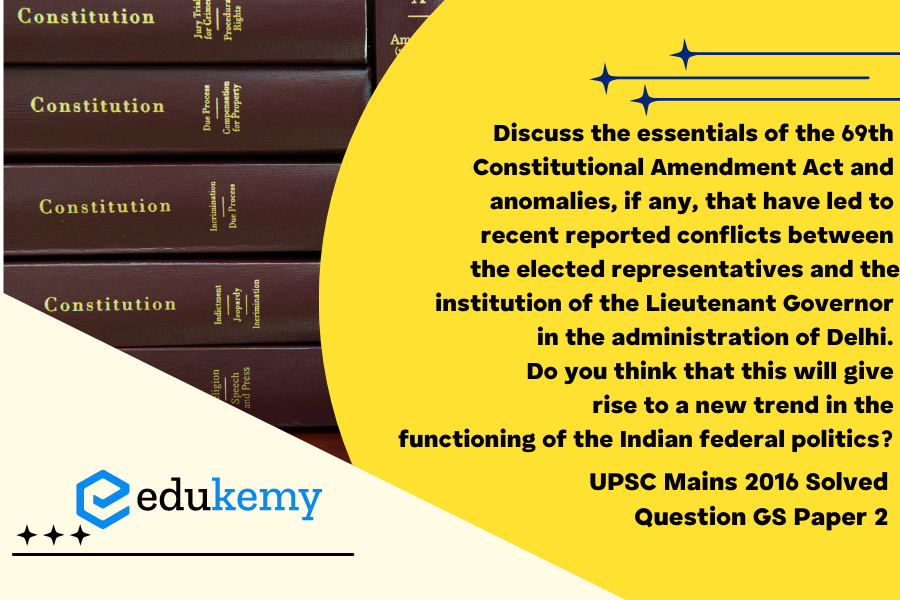The 69th Constitutional Amendment Act of 1991 was a landmark development aimed at providing Delhi with special status as a National Capital Territory (NCT) and enhancing its autonomous governance. However, recent conflicts between elected representatives and the Lieutenant Governor (LG) have brought to light certain anomalies within the amendment, sparking debates on the efficacy of its provisions. The Act conferred legislative powers upon the Delhi Legislative Assembly, allowing it to legislate on all matters except those related to police, public order, and land. Nevertheless, clashes have arisen over the interpretation and implementation of these provisions, with the LG asserting control over key administrative decisions. This power struggle has resulted in administrative inefficiencies and a strained relationship between elected representatives and the LG.
Tag: Appointment to various Constitutional posts, powers, functions, and responsibilities of various Constitutional Bodies.
Contents
Decoding the Question:
- In the Introduction, briefly write about the 69th Constitutional Amendment Act.
- In Body,
- Discuss how it led to the conflict between the elected representatives and the institution of the Lieutenant Governor.
- Also, mention how it gave rise to a new trend in the functioning of Indian federal politics.
- In Conclusion, try to suggest a way forward.
Answer:
Delhi has a peculiar federal architecture. Before the 69th Constitutional Amendment Act of 1991, Delhi was a Union Territory. The amendment re-designated it as the National Capital Territory of Delhi and designated the administrator of Delhi as the Lieutenant Governor (LG). It also created a Legislative Assembly with a Chief Minister, which can make laws on all matters of the State List except public order, land, and police, and a Council of Ministers for Delhi to aid and advise the LG in exercising his functions.
How it led to Conflict Between the Elected Representatives and Lieutenant Governor:
- The recent cases of conflicts between the LG and the government have largely happened due to the assertion of this discretion by the LG about matters such as appointments, like that of Parliamentary Secretaries.
- The ambiguities concerning the discretion of LG have resulted in a tussle between his office and the government.
- The government has accused the LG of acting on behalf of the center to prevent the proper functioning of the government. It claims that the LG should act on the aid and advice of CoM on matters except those stated in the amendment.
- Since Delhi is the seat of the national capital territory and that of the central government, the center is bound to have a say in the matters of the city.
- At the same time, the LG should not interfere in the day-to-day running of the government. The LG has a dual role as an administrative and constitutional head. A balance of jurisdictions needs to be determined so that the citizens don’t suffer due to the policy paralysis happening due to this turf war. The ultimate loser is the governance and people of Delhi.
How it gave rise to a New Trend in Indian Federal Politics:
- In a democracy with huge socio-economic diversity, the elected representatives reflect the will of the people, and special administrative provisions provide smooth functioning of the government.
- It can inspire all other States to follow suit in a democracy and semi-federal governance system like India for a model governance system.
- The government was engaged in a constant conflict with the Centre over policy decisions and the powers of the L-G with the elected government in recent times.
- The ultimate loser is governance and the people of Delhi due to the frequent conflict. It jeopardizes the administrative mechanism and growth and development in the region.
- It may also create fear among other federal units and can be a potential threat to the federal structure of the country.
- Thus, the successive governments in Delhi have asked for more power and full statehood.
The Union Territories having legislatures with ultimate control vested in the central administrator are not workable for the federal structure of India. There is a need for harmonious functioning based on the spirit of cooperative federalism between the two. A fine balance of jurisdictions needs to be determined so that the citizens don’t suffer as a result of the policy paralysis. The Supreme Court, in the NCT of Delhi versus Union of India case, tried to resolve the legal controversy between the LG and Delhi Government.
In case you still have your doubts, contact us on 9811333901.
For UPSC Prelims Resources, Click here
For Daily Updates and Study Material:
Join our Telegram Channel – Edukemy for IAS
- 1. Learn through Videos – here
- 2. Be Exam Ready by Practicing Daily MCQs – here
- 3. Daily Newsletter – Get all your Current Affairs Covered – here
- 4. Mains Answer Writing Practice – here


